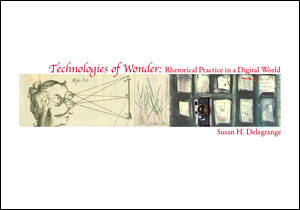Read the book:
https://ccdigitalpress.org/book/wonderAwards
Winner of the 2011 Computers and Composition Distinguished Book Award
Winner of the 2012 Winifred Bryan Horner Outstanding Book Award from the Coalition of Women Scholars in the History of Rhetoric
Winner of the 2013 CCCC Outstanding Book Award
Description
Technologies of Wonder: Rhetorical Practice in a Digital World considers the theoretical and pedagogical implications of designing academic scholarship in interactive digital media, and proposes renewed emphasis on embodied visual rhetoric and on the canon of arrangement as an active visual practice. This project uses the concept of the Wunderkammer to argue for techné and wonder as guiding principles for a revitalized visual canon of arrangement and as new models of invention and intervention in multimodal scholarly production. Technologies of Wonder also presents examples of how this rhetoric of inquiry can be applied to multimodal projects in the classroom.
New digital technologies offer viable alternatives to linear, less embodied traditions of academic scholarship. Emerging at a time when academic presses are under considerable economic pressure, Technologies of Wonder also serves as a model for how rigorous intellectual projects can be published and disseminated in less costly, more accessible formats.
Please Note: This book is best viewed in Adobe Reader. Other PDF viewers may not display all of the contained media.
- Publication date:
November 2011 - ISBN:
978-0-87421-871-8 - APA Citation:
Delagrange, Susan H. (2011). Technologies of Wonder: Rhetorical Practice in a Digital World. Logan, UT: Computers and Composition Digital Press/Utah State University Press. Retrieved from http://ccdigitalpress.org/wonder.
- MLA Citation:
Delagrange, Susan H. Technologies of Wonder: Rhetorical Practice in a Digital World. Logan, UT: Computers and Composition Digital Press/Utah State University Press, 2011.
- Copyright:
Copyright © 2011 Susan H. Delagrange and Utah State University Press/Computers and Composition Digital Press. Some rights reserved.
For personal noncommercial use, readers may download/print a copy of the ebooks found on this site, and may link to this page. Readers may not reproduce this ebook or project, or display it on another web site. In no way does the above affect any of the following rights: fair use rights; the author's moral rights; rights other persons may have either in the work itself or in how the work is used.
Per U.S. copyright law, readers may, without permission, use limited portions of copyrighted work for the purpose of analysis, review, critique, parody, etc. All such use should be accompanied by appropriate attribution to both the author and the publisher.
Requests for permission to use materials from this ebook or project in new publications should be directed to Utah State University Press on behalf of Computers and Composition Digital Press.
Utah State University Press
3078 Old Main Hill
Logan, Utah 84322-3078
